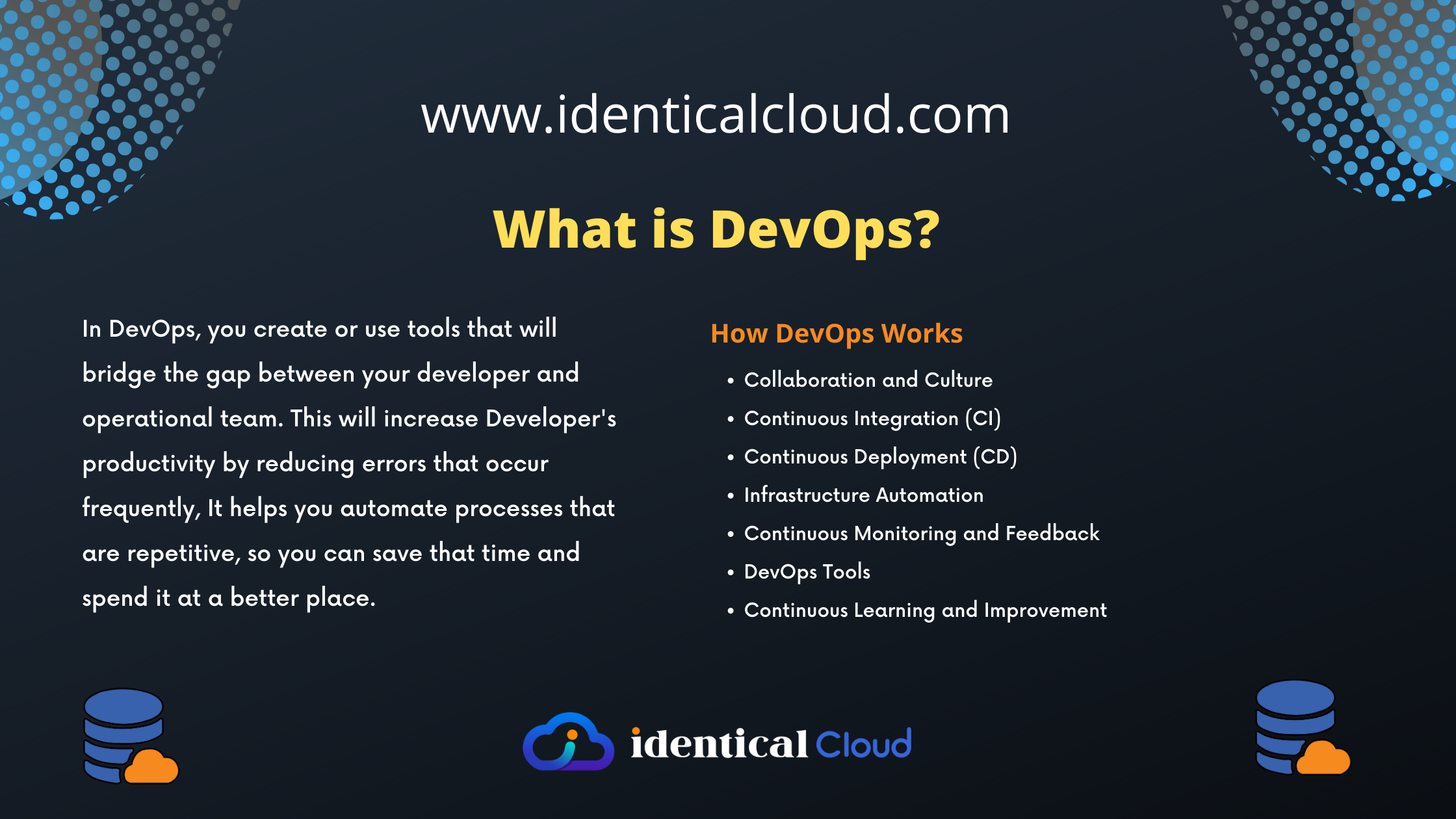
What is DevOps?
I’ve been DevOps Engineer for the past 4 years and I’m here to tell you what is DevOps, What does it actually mean by being DevOps Engineer. How do you know if your company/project needs DevOps or not.
What is DevOps?
Firstly, DevOps is not a technology but a mindset. For an e.g. Agile is the process of software development, DevOps can be integrated with it.
In DevOps, you create or use tools that will bridge the gap between your developer and operational team. This will increase Developer’s productivity by reducing errors that occur frequently, It helps you automate processes that are repetitive, so you can save that time and spend it at a better place. DevOps design tools that can be integrated with your servers, and cloud providers and can give yoy insights on what is going on.
- CI/CD tools
- Ansible
- Monitoring
- Logging
- Uptime
DevOps Model Defined
DevOps is a set of practices that combines software development (Dev) and IT operations (Ops). The goal of DevOps is to shorten the systems development life cycle and provide continuous delivery with high quality.
DevOps teams are typically responsible for the entire software development lifecycle, from conception to deployment and maintenance. This includes tasks such as:
- Coding
- Testing
- Deployment
- Monitoring
- Troubleshooting
DevOps teams use a variety of tools and technologies to automate tasks and improve communication between developers and operations teams. Some of the most commonly used DevOps tools include:
- Version control systems
- Continuous integration and continuous delivery (CI/CD) tools
- Monitoring tools
- Communication tools
DevOps is a relatively new approach to software development, but it has quickly gained popularity in recent years. The benefits of DevOps include:
- Increased speed and agility
- Improved quality
- Reduced costs
- Increased customer satisfaction
DevOps is a complex and ever-evolving field, but it can be a valuable tool for any organization that wants to improve its software development process. If you are looking for ways to speed up your development process, improve your quality, and reduce your costs, DevOps is a good option to consider.
How DevOps Works
DevOps works by integrating development (Dev) and operations (Ops) teams, processes, and tools to streamline software development, deployment, and operations.
Here’s a step-by-step breakdown of how DevOps works:
- Collaboration and Culture:
- Establish a collaborative culture that emphasizes shared goals and responsibilities between development and operations teams.
- Encourage open communication, trust, and cross-functional collaboration.
- Continuous Integration (CI):
- Developers frequently integrate their code changes into a shared repository.
- Automated build processes verify code quality, run tests, and provide feedback.
- Developers receive immediate feedback on integration issues, ensuring early detection and resolution.
- Continuous Deployment (CD):
- Automate the deployment process to release software updates rapidly and reliably.
- Infrastructure as Code (IaC) techniques allow for consistent and reproducible deployments.
- Automated testing and validation processes ensure the stability and quality of deployments.
- Infrastructure Automation:
- Treat infrastructure as code, using scripts or declarative configurations.
- Automate the provisioning and management of infrastructure resources, such as servers, networks, and databases.
- Infrastructure changes can be version-controlled, tested, and deployed using the same principles as application code.
- Continuous Monitoring and Feedback:
- Monitor applications and infrastructure in real-time.
- Collect and analyze performance metrics, log data, and user feedback.
- Proactively identify issues, troubleshoot bottlenecks, and optimize system performance.
- Provide feedback loops to development teams for continuous improvement.
- DevOps Tools:
- Utilize a range of tools for various DevOps stages, including version control systems (e.g., Git), build automation (e.g., Jenkins), configuration management (e.g., Ansible), containerization (e.g., Docker), orchestration (e.g., Kubernetes), and monitoring (e.g., Prometheus).
- Utilize a range of tools for various DevOps stages, including version control systems (e.g., Git), build automation (e.g., Jenkins), configuration management (e.g., Ansible), containerization (e.g., Docker), orchestration (e.g., Kubernetes), and monitoring (e.g., Prometheus).
- Continuous Learning and Improvement:
- Embrace a culture of continuous learning and improvement.
- Conduct post-mortems, retrospectives, and regular team discussions to identify areas for improvement.
- Iterate on processes, tools, and practices based on feedback and data.
Benefits of DevOps:
- Faster and more frequent software releases.
- Improved collaboration and communication between teams.
- Enhanced software quality and stability.
- Efficient use of resources and infrastructure.
- Faster time to market for new features and innovations.
- Better alignment of development and operations goals.
- Increased overall business agility and competitiveness.
It’s important to note that DevOps is not just about tools and automation; it also requires a cultural shift and collaboration between teams. Successful implementation of DevOps involves continuous evaluation and adaptation to meet the specific needs and goals of an organization.
FAQ’s
What is DevOps?
DevOps is a set of practices that combines software development (Dev) and IT operations (Ops). The goal of DevOps is to shorten the systems development life cycle and provide continuous delivery with high quality.
What are the benefits of DevOps?
The benefits of DevOps include:
– Increased speed and agility
– Improved quality
– Reduced costs
– Increased customer satisfaction
What are some of the key principles of DevOps?
Some of the key principles of DevOps include:
– Communication and collaboration
– Automation
– Continuous delivery
– Monitoring
– Culture
How can I implement DevOps?
There are a number of ways to implement DevOps. Some common approaches include:
– Investing in the right tools and technologies
– Educating your team on DevOps
– Starting small
– Being patient
What are some of the challenges of DevOps?
Some of the challenges of DevOps include:
– Cultural change
– Technical challenges
– Lack of resources
– Measuring success
What are some of the tools and technologies used in DevOps?
Some of the tools and technologies used in DevOps include:
– Version control systems
– Continuous integration and continuous delivery (CI/CD) tools
– Monitoring tools
– Communication tools
